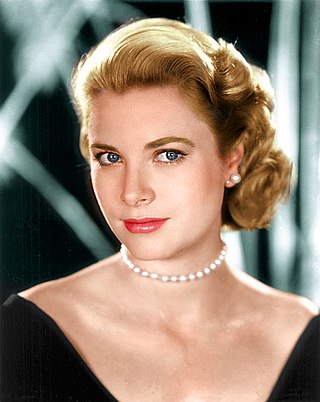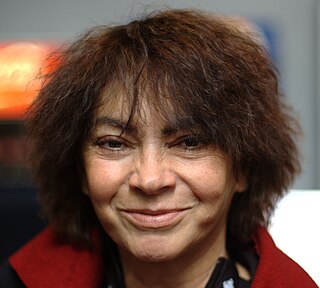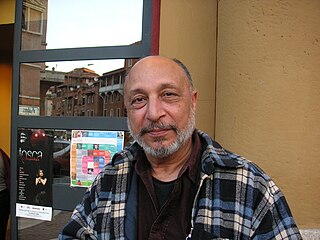Related Research Articles

Grace Patricia Kelly was an American actress who, after starring in several significant films in the early to mid-1950s, became Princess of Monaco by marrying Prince Rainier III in April 1956.

Ovidie is a French director, actress, producer, journalist, ex porn actress and a writer. First known as a porn actress from 1999 to 2003, she has since directed pornographic films as well as documentaries and has written several books.

Lise Payette was a Canadian politician, journalist, writer, and businesswoman. She was a Parti Québécois (PQ) minister under the leadership of Premier René Lévesque and National Assembly of Quebec member for the riding of Dorion. Originally a journalist, Payette became a television host in the 1960s. She left politics in 1981 and returned to a successful career in television production and writing.

Smita Patil was an Indian actress of film, television, and theatre. Regarded among the finest Indian stage and film actresses, she appeared in over 80 films in several languages, but mostly in Hindi and Marathi, in a career that spanned just over a decade. During her career, she received two National Film Awards and a Filmfare Award. She was the recipient of the Padma Shri, India's fourth-highest civilian honour in 1985.

Nabil Ayouch is a Franco-Moroccan television and film director, producer, and writer. His films have screened at international film festivals including the Cannes Film Festival and Montreal World Film Festival.
Farida Diouri was a Moroccan novelist. She began to write at age 40, and her first novel, Vivre dans la dignité, ou mourir was selected for the Grand Atlas Prize, organized by the French Embassy in Morocco.

The history of the cinema of Morocco dates back to "The Moroccan Goatherd" by Louis Lumière in 1897. During the French protectorate, films were produced and directed by French filmmakers, and in 1952, Orson Welles directed his Othello in the historic city of Essaouira. Since independence in 1956, Moroccan film directors and producers have produced a growing number of films, some of which have been met with growing international success.

Jocelyne Saab was a Lebanese journalist and film director. She is recognized as one of the pioneers of Lebanese cinema. A reporter, photographer, scriptwriter, producer, director, artist and founder of the Cultural Resistance International Film Festival of Lebanon, Saab focused on the deprived and disadvantaged – from displaced peoples to exiled fighters, cities at war and a Fourth World without a voice. Her work is grounded in historic violence, and in an awareness of the actions and images required to document, reflect on and counteract it.
Holly Dale is a Canadian filmmaker and television director. Over the course of her career, Dale has worked in the Canadian film and television industry as a director, producer, writer, and editor. Although she has completed solo projects, the majority of Dale's work has been in collaboration with her former classmate, Janis Cole. The Thin Line (1977), P4W: Prison for Women (1981), and Hookers on Davie (1984) are some of their most recognized projects. Dale's work has been featured in festivals around the world including North America, Europe, and Australia. She has also received award nominations and wins, including a Gemini Award in 1982 for the Best Theatrical Documentary for P4W: Prison for Women.

Sheila Nevins is an American television producer and head of MTV Documentary Films division of MTV Studios. Previously, Nevins was the President of HBO Documentary Films. She has produced over 1,000 documentary films for HBO and is one of the most influential people in documentary filmmaking. She has worked on productions that have been recognized with 35 News and Documentary Emmy Awards, 42 Peabody Awards, and 26 Academy Awards. Nevins has won 31 individual Primetime Emmy Awards, more than any other person. She is also a member of the Peabody Awards board of directors, which is presented by the University of Georgia's Henry W. Grady College of Journalism and Mass Communication.

Thierry Michel is a Belgian film director, mostly making social and political documentaries. His office and company Les films de la passerelle is located in Liège, where he works with the producer Christine Pireaux. Over a twenty-year period he has made a series of documentaries on different aspects of Zaire . Taken together his films provide a unique overview of the social, economic and political life of the country.

Beaune-la-Rolande internment camp was an internment and transit camp for foreign-born Jews, located in Beaune-la-Rolande in occupied France, it was operational between May 1941 and July 1943, during World War II.
Farida Benlyazid is a Moroccan scriptwriter, producer, production manager, novelist, and director. She began working in the field of cinema and cinematic production in the seventies. According to Sandra Gayle Carter, author of What Moroccan Cinema? : A Historical and Critical Study, Benlyazid continues to be one of the few Moroccan women in the field. From the start of her career up until 2003, she was the only female filmmaker in Morocco. Benlyazid's films, novel adaptations, documentaries and scripts have garnered much international recognition. She has become known for representing the struggles and obstacles faced by Moroccan women and incorporating her own personal experiences into her scripts and films.
Amal Ayouch is a Moroccan actress who since the late 1990s has performed in the French language both on stage and, above all, in film. In January 2015, she was honoured with an award at the African Women's Film Festival in Brazzaville. Ayouch has played a leading role in Morocco's Fondation des arts vivants.
Irene Lilienheim Angelico is a Canadian film director, producer and writer.
Women's Wiles is a 1999 film directed by Farida Belyazid. The film was screened at multiple Moroccan film festivals as well as the Beirut Film Festival and the Berlin International Film Festival.
Fatima Boubekdi is a Moroccan filmmaker.

Jillali Ferhati is a Moroccan filmmaker.
Deux femmes sur la route is a 2007 drama film directed by Farida Bourquia.
La braise is a 1982 Moroccan film directed by Farida Bourquia in her directorial debut. It was one of only two feature films made in Morocco by female directors in the 1980s, and is considered to be one of the first Moroccan feature films directed by a woman.
References
- 1 2 3 4 Valérie K. Orlando (2011). Screening Morocco: Contemporary Film in a Changing Society. Ohio University Press. pp. 144–. ISBN 978-0-89680-478-4.
- ↑ Armes, Roy (2003). "Cinema in the Maghreb". In Oliver Leaman (ed.). Companion Encyclopedia of Middle Eastern and North African Film. Routledge. p. 204. ISBN 978-1-134-66252-4.